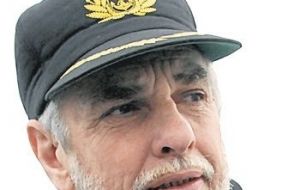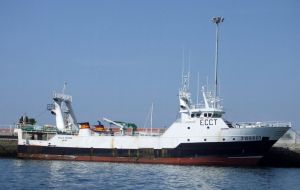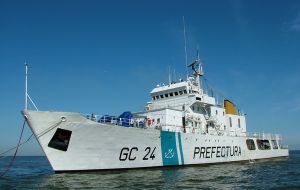MercoPress. South Atlantic News Agency
Uruguayan navy air patrol escorts Spanish fishing vessel heading for Falklands
 Caramés: “we ensured that in Uruguayan waters third party vessels can sail to the high seas”
Caramés: “we ensured that in Uruguayan waters third party vessels can sail to the high seas”  “Villa Nores” was being harassed by an Argentine Coast Guard
“Villa Nores” was being harassed by an Argentine Coast Guard  “GC24 Mantilla” pursued the Spanish fishing vessel until it reached high seas
“GC24 Mantilla” pursued the Spanish fishing vessel until it reached high seas As Spanish vessel with Falkland Islands fishing licence was harassed Saturday morning by the Argentine Coast Guard on leaving the port of Montevideo for the South Atlantic and had to reroute course in Uruguayan waters until reaching the high seas.
All along “Villa Nores” was followed at a distance by the Argentine Coast Guard “GC 24 Mantillas”, sailing in River Plate shared waters, while a Uruguayan naval aircraft patrol followed from the air to ensure the vessel was not intercepted while on the Uruguayan side of the River Plate.
The incident is bound to escalate the current tense situation between Uruguay, which recently officially stated that no Falklands’ flagged vessels are allowed to dock in Montevideo (in support of Argentina’s sovereignty claim), Britain who runs foreign affairs and defence for the Overseas Territory and Spain which has seen many of its fishing vessels challenged or intercepted by the Argentine Coast Guard for allegedly operating in “Argentine waters” of the South Atlantic.
According to the Uruguayan Navy commander in chief, Alberto Caramés the air patrol was sent out “to protect the right to free navigation of the Spanish vessel so it could reach the high seas”.
The Navy commander also revealed that the whole incident was closely followed by Uruguayan president Jose Mujica, Minister of Defence Eleuterio Fernandez Huidobro and Foreign Affairs minister Luis Almagro who feared the whole situation could “become sour”.
The incident took off Saturday early morning when the Spanish flagged 41 metres long “Villa Nores” left the port of Montevideo from where it normally operates for the South Atlantic. A few miles later the “GC24 Mantillas” radioed the Spanish vessel that based on Argentine government decree 256/2010 it must submit information related to destination, name of the captain, owner, number of seamen and other data.
The Argentine Coast Guard said the Villa Nores had been sailing through Argentine waters and therefore must submit the information. He also ordered the Spanish vessel to hold engines and prepare for a boarding inspection team.
The Spanish skipper ignored the Argentine demand and contacted its agents in Montevideo who recommended the Villa Nores returns to Uruguayan waters. The Argentine Coast Guard kept track at 30 miles distance along the Uruguay/Argentina shared waters of the River Plate.
“It was a typical case of ‘radio harassment’” said the Uruguayan Navy commander, adding that the whole incident was monitored by the Uruguayan Coast Guard from the port of Maldonado. A few minutes later a Super King Air 200 took off from a nearby naval airfield to keep track of the Spanish vessel and the Argentine Coast Guard unit, and taking pictures of their positions, latitude and longitude.
Finally the “Villa Nores” reached international waters and headed for the South Atlantic with no further event.
Caramés said that the Uruguayan Navy with the air patrol clearly marked “sovereignty and ensured that third party vessels can sail to the high seas with no inconveniences and proceed with their tasks”.
The ‘radio harassment’ and interception attempts by the Argentine Coast Guard demanding data from Spanish fishing vessels operating in the South Atlantic has increased in the last twelve months following the Argentine 256/2010 decree with the purpose of controlling vessels sailing in or out of the Falklands’ through the “Argentine Sea” and/or fishing with licences extended by the Falklands’ government considered by the Argentine government “illegal”.
To avoid this bullying the Spanish vessels on leaving Montevideo no longer head west but rather turn east along the Uruguayan coast until they reach high seas in the Atlantic Ocean. Most Spanish vessels proceed from Vigo and their organizations have asked Madrid to get involved in the dispute.
Earlier in the week President Mujica state that Falklands’ flagged vessels were banned from docking in Montevideo, which was later ratified by an official release from the Executive portal saying that the decision was in support of Argentina’s claim over the Falkland Islands sovereignty, but denied any Argentine pressure on the matter.
Likewise it pointed out that the ban did not include English flagged vessels which can operate as those of any other country.
The Uruguayan Foreign Affairs minister Luis Almagro described the Falklands as the last “colonial enclave” in Latin America, an ‘inadmissible’ situation and again denied any Argentine pressures on the issue.




Top Comments
Disclaimer & comment rules-

-

-

Read all commentsThe Uruguayan Foreign Affairs minister Luis Almagro described the Falklands as the last “colonial enclave” in Latin America, an ‘inadmissible’ situation and again denied any Argentine pressures on the issue.
Dec 19th, 2011 - 01:30 am 0“Argentine Sea” and/or fishing with licences extended by the Falklands’ government considered by the Argentine government “illegal”.
I think it is very clear!!!
Business as usual then.
Dec 19th, 2011 - 01:35 am 0What an abusive behaviour from Argentine Navy, but we are accustomed to it...from long time ago.
Dec 19th, 2011 - 01:42 am 0Commenting for this story is now closed.
If you have a Facebook account, become a fan and comment on our Facebook Page!